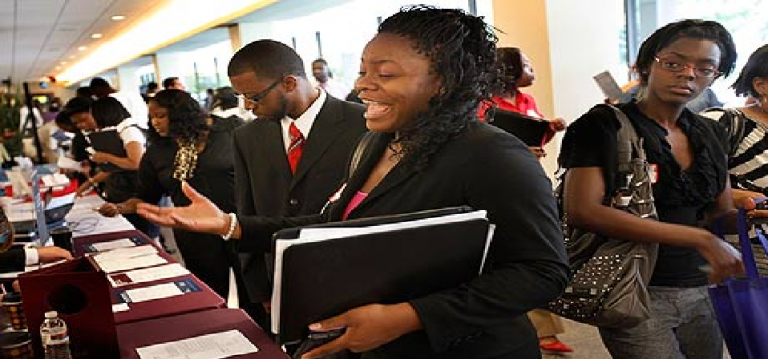BY JIMOH KEMI
THE anxiety that grips undergraduates in Nigeria as they approach graduation is a reflection of the harsh reality of the country’s unemployment crisis.
According to a new methodology adopted by the National Bureau of Statistics, the unemployment rate in Nigeria, with more than 200 million people, fell from 5.3 percent in Q4 2022 to 4.1 percent in Q1 2023.
The report read, “The unemployment rate increased significantly in Q3 2023 at 5.0 per cent. This is an increase of 0.8 per cent from Q2 2023. In Q3 2023, the labour force participation rate in Nigeria was 79.5%, having been 80.4% in Q2 2023. The participation rate among men was 80.9% and 78.2% for women.
“The employment-to-population ratio was 75.6 per cent in Q3 with a decrease of 1.5 per cent compared to a ratio of Q2. The combined rate of unemployment and time-related underemployment as a share of the labour force population increased to 17.3 per cent in Q3 from 15.5 per cent in Q2,” the report said.
This stark reality underscores the pervasive fear among students that even a degree, including first-class honors, offers no guarantee of a job, casting a long shadow over their academic achievements.
A graduate of Delta State University, Abraka, Kanuhor Douglas, addressed this issue head-on during a boot camp held at Trinity Event Center, Owa-Eke, Agbor, Delta State. Speaking to the undergraduates, Douglas laid bare the grim situation in Nigeria, emphasizing that academic excellence does not necessarily translate into job security.
He urged students to embrace resilience and innovation, advising them to seek out opportunities and become problem-solvers in their communities. According to him, success should not be defined solely by conventional standards but by the ability to adapt and create value in any circumstance. He stressed the importance of acquiring skills that can empower them to redefine success on their own terms.

Douglas also highlighted the significance of mentorship, encouraging students to seek guidance from those who have excelled in their chosen fields. In his closing remarks, he inspired the youths to face the future with enthusiasm and optimism, viewing challenges as hidden opportunities.
Echoing these sentiments, Celestine Awele, another speaker, addressed the broader issue of unemployment in Nigeria, pointing out that corruption is at the heart of the problem. “If we must move forward as a nation, we need to tackle corruption head-on,” she said, referencing former UK Prime Minister David Cameron’s description of Nigeria as “fantastically corrupt.” Awele argued that if government funds meant for development projects were not siphoned off for personal gain, the country would be on a path to recovery, ultimately improving life for the youth.
Awele also emphasized the need for sustainable youth empowerment programs, criticizing the current loan schemes as insufficient. She recalled the success of the YouWin program under the Jonathan administration, which transformed many young Nigerians into employers of labor. She advocated for the revival of such initiatives, alongside the introduction of similar programs, to address the unemployment crisis.
Moreover, Awele proposed that Nigeria’s governance structure be regionalized. She argued that the current centralized system is unwieldy and inefficient, suggesting that allowing each of the six geopolitical zones to manage its resources would spur competition and development. Such a move, she believes, would lead to the emergence of industries across the country, reducing the reliance on imports and tackling unemployment through regional economic growth.
Mr. Ben Omokwo, another speaker, shared his personal concerns as a father. He expressed the deep disappointment and frustration that parents feel when, after investing their hard-earned money in their children’s education, those children remain unemployed years after graduation. Omokwo called on the government to address this issue, emphasizing the need for an educational curriculum that prepares students for self-sufficiency rather than dependence on elusive “white-collar” jobs.
He stressed the importance of vocational training, arguing that it provides a safety net for graduates, enabling them to diversify their skills and avoid becoming burdens to their families and society. Omokwo warned that without such reforms, many young people could be driven to crime out of desperation. According to the National Bureau of Statistics, vocational training could significantly reduce unemployment by providing practical skills aligned with market needs.
Adding to the discussion, Ozegbe Imegwu, a graduate of Abia State University, shared his own experience of disillusionment after years of fruitless job searching. He expressed the frustration of seeing his hard work and his parents’ sacrifices go unrewarded, noting that many graduates like him feel that their education has been a wasted effort. Imegwu appealed to the government to create job opportunities for graduates, warning that the current situation is causing despair and eroding the value of education in Nigeria.
The anxiety of graduating into an uncertain job market is a pressing concern for many students. The high unemployment rates among young people are alarming, with over 40% of Nigerian youths aged 15-34 being unemployed or underemployed. This situation demands a shift in approach. Unemployment is not a reflection of a graduate’s worth but a call to action for systemic change. By implementing policies such as vocational training programs, fighting corruption, supporting apprenticeships, and investing in education, innovation, and entrepreneurship, the government can help bridge the gap between education and employment.
Additionally, initiatives like career counseling, mental health support, and job placement services can help alleviate the anxiety and uncertainty faced by graduates. The establishment of job creation agencies and partnerships with private sector employers could also create more pathways for employment. It’s time for the government to take proactive steps to address this critical issue and ensure that the next generation of leaders and innovators can thrive in a rapidly changing world. Together, we can turn the anxiety of graduating into the excitement of starting a fulfilling career, creating a brighter tomorrow for all.


